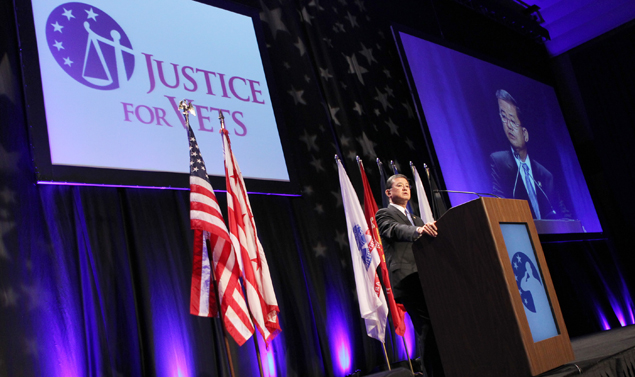
General Eric Shinseki, Secretary of Veterans Affairs, discusses the VA's support for Veterans Treatment Courts during the inaugural Justice For Vets Veterans Treatment Court conference at the Marriott Wardman Park Hotel on Monday, December 2, 2013 in Washington, DC. (Paul Morigi/AP Images for The National Association of Drug Court Professionals)
Secretary of Veterans Affairs Eric K. Shinseki spoke today at the National Association of Drug Court Professionals Inaugural Veterans Treatment Court Conference held in Washington D.C.
“The power of the Veterans court concept was clear, undeniable, and compelling,” Shinseki said.
According to Justice For Vets, The first Veterans Treatment Court was founded in 2008 by Judge Robert Russell in Buffalo, New York, after he noticed an increase in the number of Veterans appearing on his Drug Court and Mental Health Court dockets.
“Instead of either jailing Veterans, who have been brought up on charges, or releasing them back to the streets, you (Russell) have underwritten treatment as a powerful option for dealing with those who have broken our laws,” the secretary said, in recognizing Judge Russell, who also attended the conference.
The number of Veterans courts has grown over the past five years, Shinseki said. When he visited Judge Russell’s courtroom in early 2009, there were maybe four or five courts already established.
“Since that visit, VA has been your full partner, agreeing to bring all of its capabilities to bear, wherever a judge is willing to establish a Veterans court,” he said.
Last month, VA’s justice outreach specialists reported 257 Veterans courts in operation throughout this country—an increase of nearly 90 this year alone, with another dozen or so slated to open before year’s end.
Veterans Treatment Courts allow jurisdictions to serve a large segment of the justice-involved Veteran population as opposed to having Veterans appear before judges who may or may not have an understanding of their unique problems. Because a Veterans Treatment Court judge handles numerous Veterans’ cases and is supported by a strong, interdisciplinary team, he or she is in a much better position to exercise discretion and effectively respond than a judge who only occasionally hears a case involving a Veteran defendant. A Veterans Treatment Court judge better understands the issues that a Veteran may be struggling with, such as substance addiction, PTSD, traumatic brain injury and military sexual trauma.
Find the complete transcript of the Secretary’s speech here. Find more information about Veterans Courts here. Additionally, 60 Minutes did a story on the courts in 2012. You can view that story here.
Topics in this story
More Stories
Summer Sports Clinic is a rehabilitative and educational sporting event for eligible Veterans with a range of disabilities.
Report examines the input of over 7,000 women Veterans: They are happier with VA health care than ever before.
Veterans and caregivers, you can help shape the future eligibility requirements for the VA Caregiver Support program.







“Problem-solving courts look to the underlying issues that bring people into the court system, employ innovative approaches to address those issues, and seek to simplify the court process for litigants.” This may be useful in the short term but I believe not enough time and research has been spent determining how much harder PTSD is to treat given the extra-ordinary trauma imposed on the combat solder in the 21st century field of battle. I speak as a clinical psychologist and an ex-marine.
Bexar County’s VTC rejected my application because I wasn’t a combat veteran – despite extensive documentation of MST/PTSD.
The idea behind the program is great, but at the moment is not very helpful to the majority of female veterans. I’d like to see that change, even if it is too late for my case.
Given the high incidence of substance abuse among veterans with PTSD, these courts represent a chance for change as opposed to punishment with virtually no chance for change.
Can you make it any harder
Civilians often have the same problems as Veterans usually for similar reasons.
No need.
Ignoring this won’t help you.